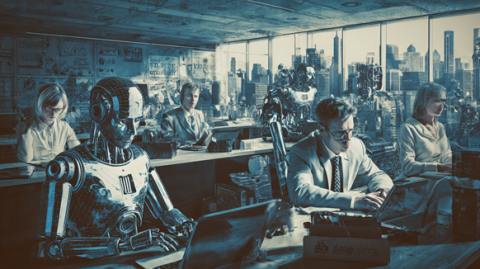Microsoft researchers: To fend off AI, consider a job as a pile driver
The researchers analyzed more than 200,000 anonymized interactions with Bing Copilot, Microsoft's AI search engine assistant, which summarizes search results and provides answers rather than lists of web pages – similar to the AI Overviews in Google Search. They focused on measuring the applicability of generative AI to common work activities such as "Getting Information," "Communicating with People Outside the Organization," and "Performing for or Working Directly with the Public." They then mapped that data to specific occupations.
Overall, they found that the answers provided by Bing Copilot are more applicable to occupations that require at least a bachelor's degree. And they are least applicable to healthcare support and jobs involving physical labor, like farming and construction. The project, described in a pre-print paper titled "Working with AI: Measuring the Occupational Implications of Generative AI," did not try to answer how AI might affect wages or lead to job loss, however.
"It is tempting to conclude that occupations that have high overlap with activities AI performs will be automated and thus experience job or wage loss, and that occupations with activities AI assists with will be augmented and raise wages," wrote authors Kiran Tomlinson, Sonia Jaffe, Will Wang, Scott Counts, and Siddharth Suri. "This would be a mistake, as our data do not include the downstream business impacts of new technology, which are very hard to predict and often counterintuitive."
As an example, they cite research from 2015 describing how Automatic Teller Machines (ATMs) actually led to an increase in bank branches and bank tellers, who refocused on building customer relationships.
"Our study explores which job categories can productively use AI chatbots," Tomlinson, a senior researcher at Microsoft, told The Register in an emailed statement. "It introduces an AI applicability score that measures the overlap between AI capabilities and job tasks, highlighting where AI might change how work is done, not take away or replace jobs. Our research shows that AI supports many tasks, particularly those involving research, writing, and communication, but does not indicate it can fully perform any single occupation. As AI adoption accelerates, it's important that we continue to study and better understand its societal and economic impact."
Most and least affected jobs
According to the paper, the top ten jobs where AI applicability overlaps the most with expected tasks are:
- Interpreters and Translators
- Historians
- Passenger Attendants
- Sales Representatives of Services
- Writers and Authors
- Customer Service Representatives
- CNC Tool Programmers
- Telephone Operators
- Ticket Agents and Travel Clerks
- Broadcast Announcers and Radio DJs
The ten occupations least exposed to AI include:
- Logging Equipment Operators
- Motorboat Operators
- Orderlies
- Floor Sanders and Finishers
- Pile Driver Operators
- Rail-Track Laying and Maintenance Equipment Operators
- Foundry Mold and Coremakers
- Water Treatment Plant and System Operators
- Bridge and Lock Tenders
- Dredge Operators
The researchers say their findings do not mean that AI will be able to perform all the tasks expected for a given occupation. "There are definitely some occupations for which many – perhaps even most – work activities have some overlap with demonstrated AI capabilities," they say. "But even when there is overlap, the task completion rate is not 100 percent and the scope of impact is usually moderate."
As a caveat, the researchers observe that focusing on the usage of Bing Copilot may influence their findings. "The relatively high prevalence of information gathering may be due to Copilot’s connection to the Bing search engine at the time our data originates," they observe. Conversational studies of Anthropic's Claude model show more emphasis on computer and math tasks, they say.
In any event, the Microsoft boffins conclude that it's too early to tell how AI will affect specific occupations. But if you're looking for a stable and low-change career, perhaps consider learning how to operate a pile driver.
Thomas Claburn

